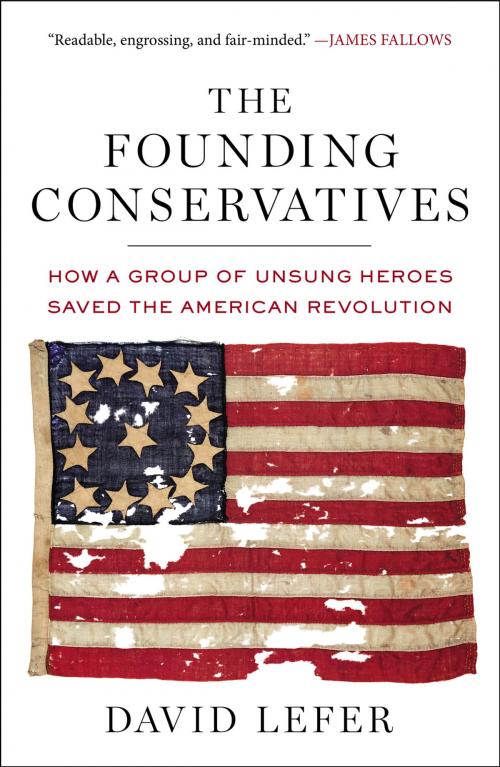The Founding Conservatives
How a Group of Unsung Heroes Saved the American Revolution
Nonfiction, History, Americas, United States, Revolutionary Period (1775-1800), Social & Cultural Studies, Political Science| Author: | David Lefer | ISBN: | 9781101622667 |
| Publisher: | Penguin Publishing Group | Publication: | June 13, 2013 |
| Imprint: | Sentinel | Language: | English |
| Author: | David Lefer |
| ISBN: | 9781101622667 |
| Publisher: | Penguin Publishing Group |
| Publication: | June 13, 2013 |
| Imprint: | Sentinel |
| Language: | English |
“It is not only the cause, but our manner of conducting it, that will establish character.”
—John Dickinson, 1773
A nation at war and widespread mistrust of the military. A financial crash and an endless economic crisis. A Congress so divided it barely functioned. Bitter partisan disputes over everything from taxation and the distribution of wealth to the role of banks and corporations in society. Welcome to the world of the Founding Fathers.
According to most narratives of the American Revolution, the founders were united in their quest for independence and steadfast in their efforts to create a stable, effective government. But the birth of our republic was far more complicated than many realize. The Revolution was nearly derailed by extremists who wanted to do too much, too quickly and who refused to rest until they had remade American society. If not for a small circle of conservatives who kept radicalism in check and promoted capitalism, a strong military, and the preservation of tradition, our country would be vastly different today.
In the first book to chronicle the critical role these men played in securing our freedom, David Lefer provides an insightful and gripping account of the birth of modern American conservatism and its impact on the earliest days of our nation.
Among these founding conservatives were men like John Dickinson, who joined George Washington’s troops in a battle against the British on July 4, 1776, and that same week drafted the Articles of Confederation; James Wilson, a staunch free-market capitalist who defended his home against a mob of radicals demanding price controls and in the process averted a bloody American equivalent to Bastille Day; Silas Deane, who mixed patriotism with profit seeking while petitioning France to aid America; and Robert Morris, who financed the American Revolution and founded the first bank and the first modern multinational corporation in the United States.
Drawing on years of archival research, Lefer shows how these and other determined founders championed American freedom while staying faithful to their ideals. In the process, they not only helped defeat the British but also laid the groundwork for American capitalism to thrive.
The Founding Conservatives is an intellectual adventure story, full of gunfights and big ideas. It is also an extraordinary reminder of the punishing battles our predecessors fought to create and maintain the free and prosperous nation we know today.
“It is not only the cause, but our manner of conducting it, that will establish character.”
—John Dickinson, 1773
A nation at war and widespread mistrust of the military. A financial crash and an endless economic crisis. A Congress so divided it barely functioned. Bitter partisan disputes over everything from taxation and the distribution of wealth to the role of banks and corporations in society. Welcome to the world of the Founding Fathers.
According to most narratives of the American Revolution, the founders were united in their quest for independence and steadfast in their efforts to create a stable, effective government. But the birth of our republic was far more complicated than many realize. The Revolution was nearly derailed by extremists who wanted to do too much, too quickly and who refused to rest until they had remade American society. If not for a small circle of conservatives who kept radicalism in check and promoted capitalism, a strong military, and the preservation of tradition, our country would be vastly different today.
In the first book to chronicle the critical role these men played in securing our freedom, David Lefer provides an insightful and gripping account of the birth of modern American conservatism and its impact on the earliest days of our nation.
Among these founding conservatives were men like John Dickinson, who joined George Washington’s troops in a battle against the British on July 4, 1776, and that same week drafted the Articles of Confederation; James Wilson, a staunch free-market capitalist who defended his home against a mob of radicals demanding price controls and in the process averted a bloody American equivalent to Bastille Day; Silas Deane, who mixed patriotism with profit seeking while petitioning France to aid America; and Robert Morris, who financed the American Revolution and founded the first bank and the first modern multinational corporation in the United States.
Drawing on years of archival research, Lefer shows how these and other determined founders championed American freedom while staying faithful to their ideals. In the process, they not only helped defeat the British but also laid the groundwork for American capitalism to thrive.
The Founding Conservatives is an intellectual adventure story, full of gunfights and big ideas. It is also an extraordinary reminder of the punishing battles our predecessors fought to create and maintain the free and prosperous nation we know today.















